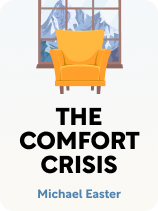

This article is an excerpt from the Shortform book guide to "The Comfort Crisis" by Michael Easter. Shortform has the world's best summaries and analyses of books you should be reading.
Like this article? Sign up for a free trial here.
Do you always eat when you’re hungry? What if you didn’t?
A consequence of our modern lifestyles is obesity. In The Comfort Crisis, Michael Easter explains that enduring the discomfort of hunger can help us move away from modern eating habits and counteract their negative effects.
Keep reading to learn the surprising benefits of hunger and Easter’s tips for fasting.
The Benefits of Hunger
Fasting is a natural human behavior and can help curb obesity. While it’s currently common to snack throughout our day, ancient humans endured hunger most of the time and ate only one or two large meals per day.
Easter details some of the benefits of hunger, showing how fasting makes us healthier in several ways:
- If you fast for 12-16 hours, you’ll fully metabolize your last meal (convert food to energy) and your body will begin to use your fat cells for energy. When this happens, you’ll shed weight.
- As your body burns up stored fat for energy, it prioritizes old, dead, or dying cells. By burning these cells off, you prevent diseases and infections and make room for new, healthy cells to be created. Picture your body as a forest and your metabolism as a fire that clears dead branches from the forest floor and creates space for new growth.
- Fasting also gives you a surge of energy from adrenaline and cortisol, which can help you focus and perform better throughout your day. This is because whenever humans used to be hungry, it was important to perform our best in order to hunt down and secure food.
| Have We Really Evolved to Fast? Although fasting has several proven benefits, experts say that our dietary behaviors may not be as slow-evolving and evolutionarily mismatched with our modern eating opportunities as Easter implies. In other words, our ancestral history of fasting may not mean we need to follow that same pattern today. This is because humans have demonstrated the ability to adapt to local food types and availability levels throughout human history. For example, Andean people of South America adapted to digesting starches after potatoes became a staple crop, and about a third of people can digest dairy products even though we’ve only been drinking milk for roughly 7,500 years. Additionally, experts say that hunter-gatherers fasted not because it was their choice to do so, but because they simply didn’t have food to eat until they hunted or gathered it. In other words, it very likely wasn’t the diet of choice, it was their only choice. So, it’s best to decide what your personal health goals are and make a diet decision that’s best for you. If you decide that the benefits above are worth embracing the discomfort of hunger, then intermittent fasting may be for you. |
Here are a few of Easter’s tips to fast effectively:
- Skip breakfast. This will make it easier to stretch out your fasting window to 12 to 16 hours, which will help you unlock the benefits of fasting we mentioned above.
- Schedule an occasional full-day fast. Easter says that fasting for 24 hours enhances the metabolic cell clean-out and also helps lower your general appetite.
- When you feel stressed, don’t eat—exercise. If your response to stress is a pint of ice cream, this can add up over time. So, exercise instead. Easter says walking is more stress-relieving than eating is, and it helps you lose weight rather than put it on.
(Shortform note: Because fasting will take discipline to implement into your daily routine, consider this former Navy SEAL’s advice in Discipline Equals Freedom: Establish a reason for what you want to accomplish, set a specific goal, and incrementally improve toward your goal every day. In this case, you might establish your reason for fasting as wanting to lose weight so you can be more present for your kids. Your specific goal might be to establish a fasting routine that you can maintain long-term. You could incrementally work up to that routine by starting with smaller fasting windows and ratcheting them up slowly until you reach a sustainable and healthy level.)

———End of Preview———
Like what you just read? Read the rest of the world's best book summary and analysis of Michael Easter's "The Comfort Crisis" at Shortform.
Here's what you'll find in our full The Comfort Crisis summary:
- Why a modern, comfortable lifestyle is bad for health and happiness
- Why discomforts such as being in nature, fasting, and exercising are important
- Tips on how to make discomfort your friend






